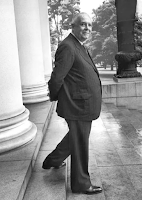Thomas Lux fairly much defies description, combining the plain speak of dilligent journalism and the eloquence of an other wise taciturn poet who will use an word or a phrase that takes a contrary turn other than where you expect it to go. He is the Poet of Unintended Results, a story teller very much in the John Cheever mode where the omniscient narrator begins yarns of folks with ambitions, intentions, desires for all manner of things making their way through their routines, only to have them interrupted and , as a consequence, find themselves to the larger world ,with what were once nuances and pesky inconviences of fact now looming over them in a crazy state of I-Told-You-So.RENDER, RENDBoil it down: feet, skin, gristle,bones, vertebrae, heart muscle, boilit down, skim, and boilagain, dreams, history, add them and boilagain, boil and skimin closed cauldrons, boil your horse, his hooves,the runned-over dog you loved, the girlby the pencil sharpenerwho looked at you, looked away,boil that for hours, render itdown, take more from the top as more settles to the bottom,the heavier, the denser, throw in acheand sperm, and a beadof sweat that slid from your armpit to your waistas you sat stiff-backed before a test, turn upthe fire, boil and skim, boilsome more, add a feverand the virus that blinded an eye, now’s the timeto add guilt and fear, throwlogs on the fire, coal, gasoline, throwtwo goldfish in the pot (their swim bladdersused for “clearing”), boil and boil, renderit down and distill,concentratethat for which there is noother use at all, boil it down, down,then stir it with rosewater, thatwhich is now one dense, fatty, scented red essencewhich you smear on your lipsand go forthto plant as many kisses upon the worldas the world can bear!This is a poet who witnesses human experience and of life itself as process that goes on regardless of the fine personal and community philosophies we've written for ourselves to abide by. Life is a raw force that will continue to pulse, change, destroy and create anew regardless of how well can describe it. We can describe life's circumstances, we cannot control them. But there is heart in Lux's work, a sympathy, that sense of the struggle of humanity trying to create meaning in a world that defies logic and yet remains a species that continues to dress the world in a wonderful cosmology of expectations. There is wit, dark humor, tenderness, a wonderfully terse lyricism in Lux's finest writing.
Tuesday, July 26, 2022
LUX'S I TOLD YOU SOs
Wednesday, July 20, 2022
DEREK WALCOTT AS PARODY
I am not a fan of Derek Walcott, and here I get the usual DW routine of reading a poet who spends an inordinate amount of time trying to make what he sees, smells, hears, tastes interesting in themselves, blessed only with an excess of qualifiers that the poem becomes something like perfectly fine cup of coffee ruined with too many spoons of sugar. It's not that I haven't tried to get acquainted with the man's work; he did win the Nobel Prize for Literature, after all, and was at the time required reading for anyone thinking themselves up on poetry. The Nobel Committee isn't infallible, though, and matched Walcott prolix poetasting in 1992 with the selection of Dario Fo in 1997, a questionably lefty playwright I think never should have been allowed the small press.
THE SEASON OF PHANTASMAL PEACEby Derek Walcott,born in St. Lucia in 1930Then all the nations of birds lifted togetherthe huge net of the shadows of this earthin multitudinous dialects, twittering tongues,stitching and crossing it. They lifted upthe shadows of long pines down trackless slopes,the shadows of glass-faced towers down evening streets,the shadow of a frail plant on a city sill --the net rising soundless at night, the birds' cries soundless, untilthere was no longer dusk, or season, decline, or weather,only this passage of phantasmal lightthat not the narrowest shadow dared to sever.And men could not see, looking up, what the wild geese drew,what the ospreys trailed behind them in the silvery ropesthat flashed in the icy sunlight; they could not hearbattalions of starlings waging peaceful cries,bearing the net higher, covering this worldlike the vines of an orchard, or a mother drawingthe trembling gauze over the trembling eyesof a child fluttering to sleep;it was the lightthat you will see at evening on the side of a hillin yellow October, and no one hearing knewwhat change had brought into the raven's cawing,the killdeer's screech, the ember-circling choughsuch an immense, soundless, and high concernfor the fields and cities where the birds belong,except it was their seasonal passing, Love,made seasonless, or, from the high privilege of their birth,something brighter than pity for the wingless onesbelow them who shared dark holes in windows and in houses,and higher they lifted the net with soundless voicesabove all change, betrayals of falling suns,and this season lasted one moment, like the pausebetween dusk and darkness, between fury and peace,but, for such as our earth is now, it lasted long.
Tuesday, July 12, 2022
STEVENS MAKES HIS OWN GROOVE
Beauty is momentary in the mind--The fitful tracing of a portal;But in the flesh it is immortal.The body dies; the body's beauty lives.So evenings die, in their green going,A wave, interminably flowing.

